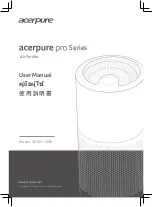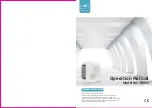
174567-UUM-D-0107
USER’S INFORMATION
MANUAL
R-22 OUTDOOR SPLIT-SYSTEM
AIR CONDITIONER
MODELS:
ERCQ
SERIES
2 TO 4 TONS
LISTED
Certification applies only
when the complete
system is listed
with ARI.
ISO 9001
Certified Quality
Management System
R
N
E
M
P
I
U
Q
E
T
Y
R
A
T
I
N
U
0
1
2
A
R
I
R
A
D
N
A
T
S
D
I
S
N
O
T
C
E
S
F
O
C
C
I
F
I
T
R
E
N
O
I
T
A
H
TI
W
C
G
N
I
Y
L
P
M
O
S
A
I
R
A
O
T
D
E
I
F
I
T
R
E
C
R
E
R
U
T
C
A
F
U
N
A
M
C
-
G
N
I
N O
I
TI
D
N
O
R
I
A
This high efficiency air conditioning system has been precision engi-
neered, manufactured of high quality materials, and passed many rigor-
ous tests and inspections to ensure years of satisfactory service. That’s
why you can rely on efficient, trouble-free operation.
Your system is fully automatic. Set the thermostat and forget it. And it’s
automatically protected from damage by voltage fluctuations or exces-
sive heating or cooling demands.
Your split system air conditioner consists of two units - one installed out-
doors and one installed indoors. The indoor unit may be installed in a
basement, attic, or crawl space.
HOW YOUR AIR CONDITIONER WORKS
HOW YOUR AIR CONDITIONER WORKS
HOW YOUR AIR CONDITIONER WORKS
HOW YOUR AIR CONDITIONER WORKS
If your hand is wet and you blow on it, it feels cool because some of the
moisture is evaporating and becoming a vapor. This process requires
heat. The heat is being taken from your hand, so your hand feels cool.
That’s what happens with an air conditioner. During the cooling cycle,
your system will remove heat and humidity from your home and will
transfer this heat to the outdoor air.
SYSTEM OPERATION
SYSTEM OPERATION
SYSTEM OPERATION
SYSTEM OPERATION
Your thermostat puts full control of the comfort level in your home at
your fingertips. DO NOT switch your thermostat rapidly “On” and “Off”
or between “Heat” to “Cool” This could damage your equipment. Always
allow at least 5 minutes between changes.
SETTING THE THERMOSTAT
SETTING THE THERMOSTAT
SETTING THE THERMOSTAT
SETTING THE THERMOSTAT
Although thermostats may vary widely in appearance, they are all
designed to perform the same basic function: to control the operation of
your air conditioning or heat pump system. Regardless of size or shape,
each thermostat will feature a temperature indicator; a dial, arm, or
push button for selection of the desired temperature; a fan switch to
choose the indoor fan operation; and a comfort switch for you to select
the system mode of operation.
Only approved thermostats have been tested and are fully compatible
with this equipment.
Please be aware that many different thermostats
operate on batteries or “power stealing” principals. These types of ther-
mostats can not be supported as trouble free when used with this product.
A complete operating instruction is provided by the manufacturer for
each thermostat. Familiarize yourself with its proper operation to obtain
the maximum comfort with minimum energy consumption.
If your system has been designed to allow both cooling and heating
operation, you may have either a manual change-over type, or a pro-
grammable electronic type thermostat.
Manual change-over simply means that the comfort switch must be
manually positioned every time you wish to switch from the cooling to
heating or heating to cooling modes of operation.
The computerized electronic thermostat is actually a sophisticated elec-
tronic version of a manual change-over type. This thermostat includes
features which allow “set-back” temperature variations for periods of
sleep, or while you are away during the day, and means energy savings
for you. The thermostat also features a digital clock.
The main power to the system must be kept “ON” at all times to
prevent damage to the outdoor unit compressor. If necessary,
the thermostat control switch should be used to turn the system
“OFF”. Should the main power be disconnected or interrupted
for 8 hours or longer, DO NOT attempt to start the system for 8
hours after the power has been restored to the outdoor unit.
TABLE OF CONTENTS
CONTACT INFORMATION . . . . . . . . . . . . . . . . . . . . . . . . . . . . . . . 1
HOW YOUR AIR CONDITIONER WORKS . . . . . . . . . . . . . . . . . . . . . 1
SYSTEM OPERATION . . . . . . . . . . . . . . . . . . . . . . . . . . . . . . . . . . . . 1
SETTING THE THERMOSTAT . . . . . . . . . . . . . . . . . . . . . . . . . . . . 1
Fan Operation Selection . . . . . . . . . . . . . . . . . . . . . . . . . . . . . . . . 2
MANUAL CHANGE-OVER THERMOSTAT . . . . . . . . . . . . . . . . . . 2
ELECTRONIC THERMOSTAT . . . . . . . . . . . . . . . . . . . . . . . . . . . . 2
TO MAXIMIZE OPERATING EFFICIENCY . . . . . . . . . . . . . . . . . . . . . 2
HEATING CONSERVATION . . . . . . . . . . . . . . . . . . . . . . . . . . . . . . 2
COOLING CONSERVATION . . . . . . . . . . . . . . . . . . . . . . . . . . . . . 2
CARE OF SYSTEM . . . . . . . . . . . . . . . . . . . . . . . . . . . . . . . . . . . . .2
COIL CARE . . . . . . . . . . . . . . . . . . . . . . . . . . . . . . . . . . . . . . . . . . .2
CARE OF FAN MOTORS . . . . . . . . . . . . . . . . . . . . . . . . . . . . . . . .2
FILTER CARE . . . . . . . . . . . . . . . . . . . . . . . . . . . . . . . . . . . . . . . . .3
OUTDOOR UNIT FINISH . . . . . . . . . . . . . . . . . . . . . . . . . . . . . . . .3
CLEARANCES . . . . . . . . . . . . . . . . . . . . . . . . . . . . . . . . . . . . . . . . .3
POWER INTERRUPTION . . . . . . . . . . . . . . . . . . . . . . . . . . . . . . . .3
SERVICE CALLS . . . . . . . . . . . . . . . . . . . . . . . . . . . . . . . . . . . . . . .3
PARTS INFORMATION . . . . . . . . . . . . . . . . . . . . . . . . . . . . . . . . . .3
LIMITED WARRANTY . . . . . . . . . . . . . . . . . . . . . . . . . . . . . . . . . . . . .4
CONTACT INFORMATION FOR USA
CONTACT INFORMATION FOR USA
CONTACT INFORMATION FOR USA
CONTACT INFORMATION FOR USA
•
Contact us by mail:
CONTACT INFORMATION FOR CANADA
CONTACT INFORMATION FOR CANADA
CONTACT INFORMATION FOR CANADA
CONTACT INFORMATION FOR CANADA
•
Go to website at www.york.com click on “contact”, then click on
“contact form” and follow the instructions.
•
Contact us by mail:
York International
Consumer Relations
5005 York Drive
Norman, OK 73069
DISTRIBUTED BY:
StyleCrest
801 W. 37th Street
Building #1
Wichita, Ks 67219
MANUFACTURED BY:
York International
5005 York Drive
Norman, OK 73069






















